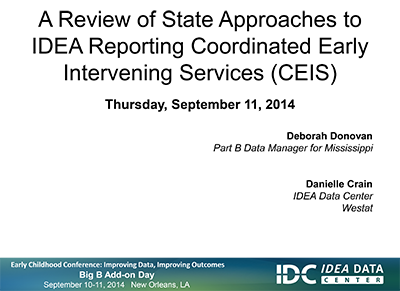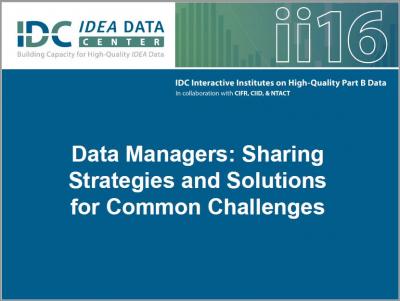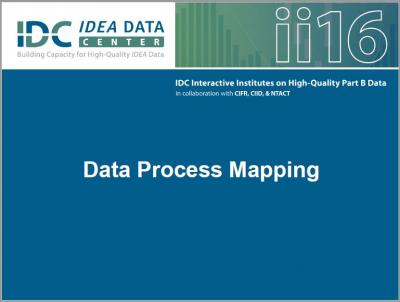Site Search
Results 1 - 7 of 29
Format: Presentations
A Review of State Approaches to IDEA Reporting of Coordinated Early Intervening Services (CEIS)IDEA allows, and sometimes requires, LEAs to use funds provided under IDEA Part B for CEIS students not identified for and receiving special education and related services. There are multiple data collection and reporting requirements associated with use of these funds for CEIS. IDC staff reviewed and led a discussion on how a diverse subset of states and their LEAs are working to meet those requirements.
Format: Presentations
Building an SSIP Evaluation PlanThe information provides guidance on developing an evaluation plan by differentiating implementation and impact. Topics addressed include translating theory of action into specific evaluation questions and possible formative and summative measures for evaluation. Helpful handouts are included.
Format: Presentations
Collecting High-Quality Data: Why It Is ImportantThis presentation focused on what is meant by the term “data quality” and provided information regarding the importance of high-quality data in the collection, reporting, and use of data in local and state decision making. Presenters shared actual examples from state experiences.
Format: Presentations
Data Managers: Sharing Strategies and Solutions for Common ChallengesThis role-alike presentation was a facilitated discussion by Part B Data Managers to explore strategies and solutions for meeting common challenges, such as working with LEAs to improve data quality, cross walking EDFacts data to SPP/APR indicators, and verifying that requirements for making data available to the public are fully met.
Format: Presentations
Data Mining Section 618 Data to Prepare the APRThe required measurements for APR Indicators B3, B4, B5, B6, B9, and B10 (the assessment, discipline, LRE, and disproportionality indicators) are based on Section 618 data. This session focused on selected section 618 data submissions and how the data can be explored to provide more in-depth information for use in discussion with state’s APR stakeholders. Presenters demonstrated some practical methods for taking a deeper look at data in the IDEA EDFacts file submissions using readily available data analysis tools (Microsoft Excel).
Format: Presentations
Data Process MappingDo you ever wonder what other states are doing to ensure high-quality data? Participants of this session learned about the work that the Kentucky Department of Education is undertaking to create data process protocols, build capacity of data stewards, and institute a culture of high-quality data. This work is being accomplished using the new IDC Data Processes Toolkit. Presenters provided an overview of the toolkit, and participants had an opportunity to experience “preparing for this work.”
Format: Applications and Spreadsheets
EDFacts IDEA Discipline Data InfographicThe EDFacts IDEA Discipline Data Infographic provides basic information about the EDFacts file specifications states use to submit IDEA Discipline data to the U.S. Department of Education. The infographic outlines details about Discipline data for children and youth with disabilities ages 3 through 21 that states must include in their annual submission of EDFacts files FS005, FS006, FS007, FS088, FS143, and FS144.








